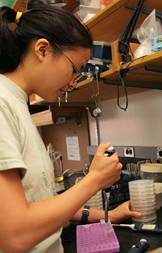Choosing a career in laboratory research can be a big step for
college students, especially those who have not experienced a
scientist's daily life "at the bench." But the 85 undergraduates who
are attending this year's Summer Undergraduate Research Program are
gaining skills that will enable them to make that choice with
confidence.
The program, which is organized by Princeton's Department of Molecular Biology,
aims to provide talented science students with an opportunity to work
in a modern laboratory, where they pursue original research projects
under the guidance of University faculty. Students from Princeton and
other schools participate in the nine-week program, which has been
expanding steadily since its inception in the late 1960s.
"We
are trying to reach out to students who would not otherwise have access
to labs like ours," said Alison Gammie, a senior lecturer in molecular
biology and director of the program. "We want to be sure the students
explore their interests and aptitudes so they are able make an informed
decision about their career paths."
Those careers often carry
program alumni to graduate school, or medical school, Gammie said. A
number choose to pursue a track that grants both an M.D. and a Ph.D. at
graduation, and for talented students with such interests the summer
experience is a valuable stepping stone.
"Some of these
students are getting their first experience with research," she said.
"We are trying very hard to reach out not only to students from smaller
colleges that don't have major research facilities, but to groups that
are traditionally underrepresented in the sciences."
Four
students this year have come to Princeton from Dillard University, a
historically black college in New Orleans that suffered extensive
damage from Hurricane Katrina. One of the Dillard students, Veronica
Sumner, said the program was teaching her new skills every day, such as
how to track the movement of proteins inside bacteria.
"I'm
really learning a lot as I go, like how to use these lab gels to
separate DNA," she said while sitting over a batch of containers full
of DNA samples. "I'm a biology major, and this is the first chance I've
had in school so far to do this kind of work."

For the entire session, the students live in Princeton dormitories
and spend their days in laboratories exploring topics that attract
them. Mike Coppola, a rising senior from the College of New Jersey,
said the program is a great way to get to know what it means to work
full time in molecular biology.
"We get paid a stipend while
we're here, but this is such an amazing experience I think I'd pay to
do it," said Coppola. "Molecular biology is a broad field, and there
are so many things you can do. Being here helps you figure out
fundamental things like which organism you want to work with."
While
Sumner is down the hall examining a species of bacteria that attack
plants, Coppola is spending his time working with E. coli, a different
one-celled organism that is found in our digestive tracts. Coppola
said, however, that the importance of the program went beyond each
student's specific project.
"I've done research before on
other subjects, but here it's different -- I'm exposed to labs and the
techniques for how to use them. That's good for me, because right now
I'm really thinking about grad school," he said. "I'm not just learning
what to do; I'm figuring out the principles behind the scientific
process. I'm learning how to learn how to do things."
Sumner and
Coppola are still exploring their options. Other students have more
well-defined career goals, and the program caters to their needs too.
Julie Wu, a rising Princeton senior who is spending her third summer in
the program, said the faculty provided many opportunities to explore
different avenues of research.
"I'm a bit unusual among
participants because I already know molecular biology is what I want to
focus on in graduate school," said Wu, who plans to apply for
M.D./Ph.D. programs. "But every week the program offers seminars on
disciplines like crystallography that I've never encountered before.
Knowing something about these other disciplines will help me as I get
deeper into science, and that makes this program a great learning
experience even if you've done it more than once."
At the end of
the summer, the entire molecular biology department gathers to hear the
results of the students' work, which they present in a conference
setting. At these poster sessions, students discuss their findings with
faculty, postdoctoral fellows and graduate students.
The major
support for the summer program comes from a long-running grant from the
Howard Hughes Medical Institute. Other important funding sources
include the New Jersey Commission on Cancer Research and donations from
Princeton alumni. Gammie said the program probably attracts such wide
support because of its authenticity.
"The students in the
program are in cutting-edge research labs doing real projects; they are
finding out things we didn't know before," Gammie said. "This is the
real deal."







